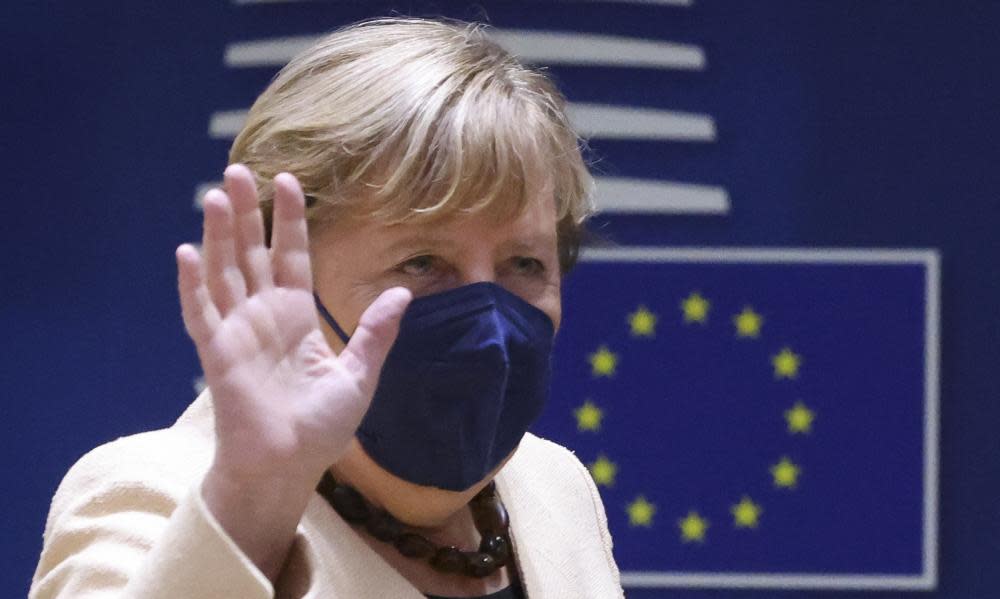Angela Merkel calls for compromise amid row over Polish ECJ snub

Angela Merkel, who earlier this week reflected on her deep hurt over Brexit, has called for European Union countries to compromise over their competing visions of integration, at what was being billed in Brussels as a farewell summit for the German chancellor.
The attempt by Merkel, at her 107th and possibly final EU summit, to smooth over a dispute over Poland’s rejection of European court of justice rulings, in an olive branch to Warsaw, came as the Dutch prime minister, Mark Rutte, demanded tough action, and Hungary’s Viktor Orbán rallied to the defence of the Polish government.
The European Commission president, Ursula von der Leyen, has threatened Poland with sanctions including a block on the dispersal of €36bn (£30bn) in pandemic recovery grants and loans over its insistence that key parts of EU law are not compatible with the Polish constitution.
The claim from Warsaw, given credence in the eyes of its government by a ruling by the country’s constitutional court, follows a series of European court of justice (ECJ) rulings demanding the repeal of measures in Poland that have been said to undermine the independence of the judiciary.
In a fiery speech in the European parliament this week, the Polish prime minister, Mateusz Morawiecki, accused the EU institutions of overreach and turning Poland into a “province”.
The Polish position has been described by France’s European affairs minister, Clément Beaune, as a “de facto” exit from the EU.
Merkel said she supported the commission in making its warning to Morawiecki over the need to respect the ECJ. But in a possible sign of the scars left by Brexit, the chancellor also warned of an “underlying problem” that needed resolution.
“It’s the question of how the individual members envision the EU,” Merkel said. “Is it an ever closer union or is it more nation state? And this is certainly not only an issue between Poland and the EU, but also in other member states.”
She added: “We must find ways and possibilities to come together again on this, because a cascade of legal disputes before the European court of justice is not a solution.”
While the Dutch government is far from being a champion of European federalism, Rutte has been outspoken about the need for member states to respect common EU values and laws if they are to enjoy the benefits of the union.
He said he expected Poland to lose funding if it continued to act in defiance of EU law.
“We have to be tough,” Rutte said. “The independence of the Polish judiciary is the key issue we have to discuss. It is very difficult to see how a big new fund of money could be made available to Poland when this is not settled.”
Belgium’s prime minister, Alexander De Croo, said: “If you want to be part of a club and have the advantages of a club, you must play by the rules. A red line has been breached and we cannot accept that.”
In an attempt to put pressure on EU leaders as they assembled, MEPs voted in favour of a resolution on Thursday calling for the commission and other 26 member states to trigger a mechanism that allows the EU to withhold funds from Poland, with 502 of 671 MEPs backing the measure.
On the other side of the argument, Orbán, whose government has also faced threats to its EU funding for failing to respect the rule of law, offered his full support to Poland.
He said: “Poland is the best country in Europe. There is no need to have any sanction, it’s ridiculous. What’s going on here is that European institutions circumvent the rights of the national parliament and government and modify the treaty without having any legitimate authority to do so. Poland is right … the real division line is common sense and non-common sense.”
Morawiecki, after a meeting with the French president, Emmanuel Macron, shortly before the summit, repeated his insistence that Poland would not be “blackmailed”, but he appeared to have softened his stance.
“We are ready for dialogue,” he said. “We will of course talk about how to resolve the current disputes in agreement and in dialogue.”
Merkel’s summit appearance, marked by a special “family photo” of the 27 heads of state and government, could prove to be her last if talks over the makeup of the next German government bear fruit before the next scheduled meeting on 16 December.

 Yahoo Movies
Yahoo Movies 
